Conflict, Stability and Security Fund: annual report 2021 to 2022
Updated 22 May 2023
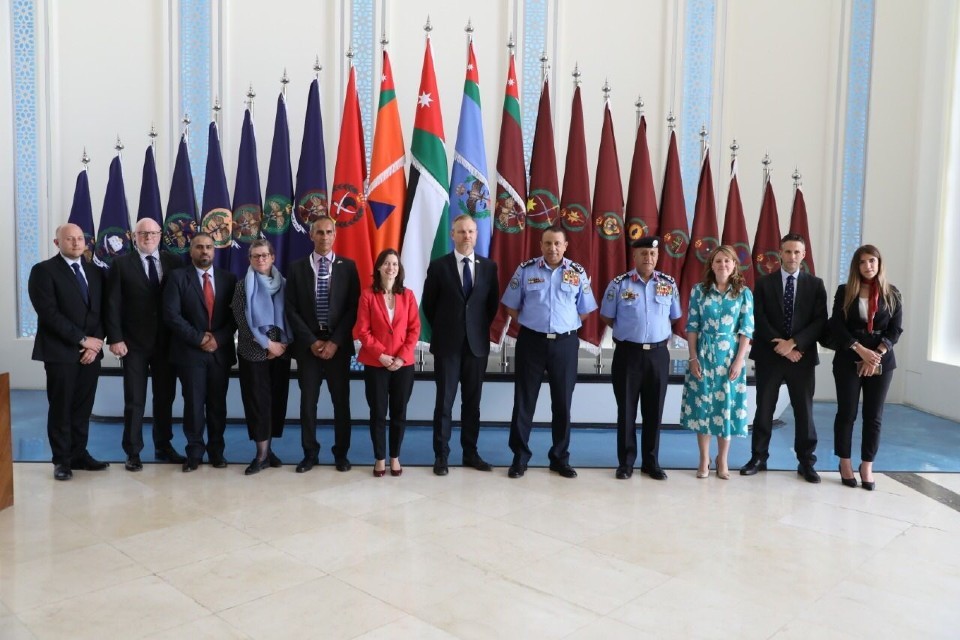
Ambassador Bridget Brind OBE and Major General Hussein Al-Hawatmeh, Director of the Jordanian Public Security Directorate (PSD), at the signing ceremony of the Policing Memorandum of Understanding between the UK and the PSD, during Assistant Commissioner Matt Jukes’ visit to Jordan in May 2022. Credit: Public Security Directorate.
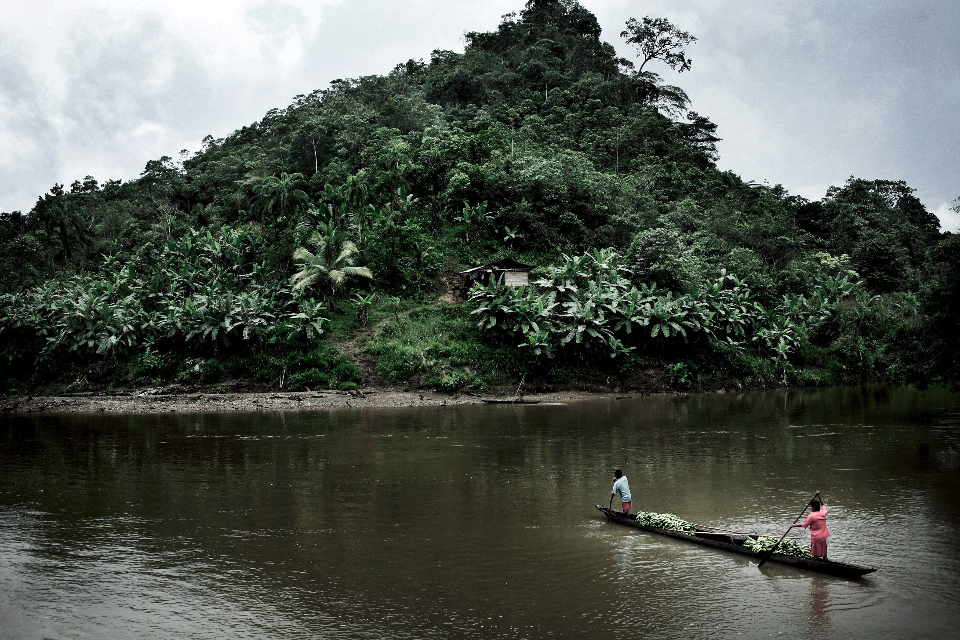
Afro-Colombian and “Embera” indigenous communities in the Pacific region of Colombia work together on community projects to strengthen local economic recovery, food security, reconciliation and environmental protection. The project is supported by the United Nations Multi-Donor Fund and the CSSF. Credit: www.fondoonucol.org / Fabio Cuttica.
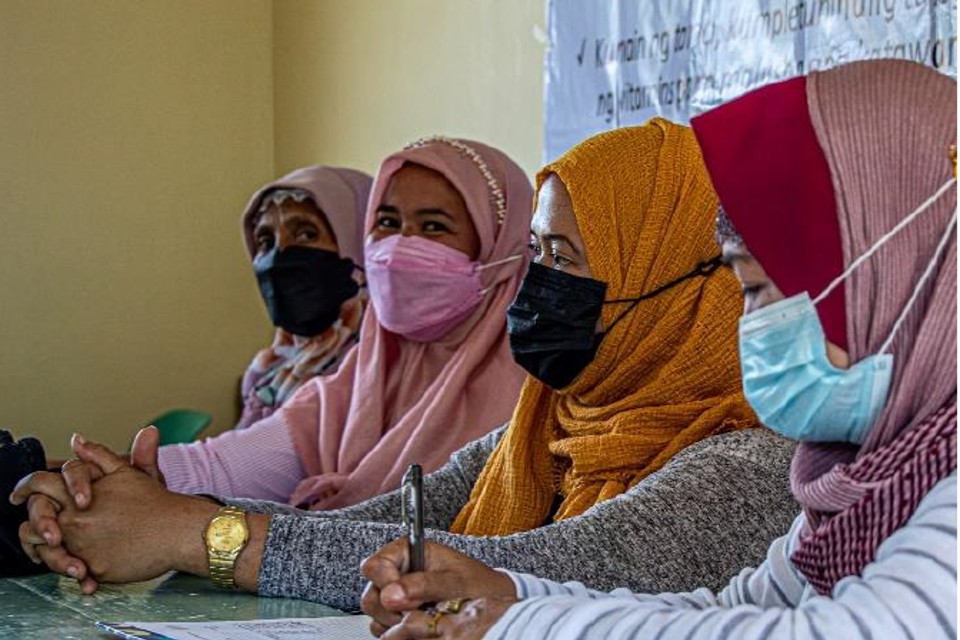
Women leaders from Datu Blah Sinsuat, Philippines, develop localised Gender and Development plans with community leaders. The CSSF Philippines programme provides support to ensure women and girls are involved in post conflict reconstruction. Credit: Catholic Relief Services Philippines.

A British soldier training members of the Zambia Defence Forces (ZDF) at the Kenneth Kaunda Peace Training Centre in Nanking, Zambia. This was part of a 10-week training programme by the British Peace Support Team Africa, supported by the CSSF. The ZDF were preparing for deployment to the UN Multidimensional Integrated Stabilisation Mission in the Central African Republic. Credit: British Peace Support Team Africa.
Ministerial foreword by Baroness Lucy Neville-Rolfe, DBE

Minister of State at the Cabinet Office Baroness Lucy Neville Rolfe, DBE.
I am honoured to have recently taken on the role of Minister for the Conflict, Stability & Security Fund (CSSF). As Minister of State in the Cabinet Office, I am proud of the unique role the CSSF plays in drawing together a cross-government approach to some of the most complex national security challenges facing our country and partners.
This Annual Report covers the activity of the Fund during the Financial Year 2021-2022. Following publication of the Integrated Review in March 2021, the mandate of the Fund was sharpened to focus on the threats and challenges facing the UK in a more competitive world. This has included increased support to our partners, for instance across the Commonwealth, in defending their critical national infrastructure against cyber attacks from malign actors.
The CSSF was designed to be flexible, innovative, catalytic and able to take high risks; as such, it was called on to display all of these principles during this reporting period. This was a difficult year by any measure, with the continued impact of the COVID-19 pandemic. CSSF support was critical in rolling out a vaccination campaign and supplying much needed personal protection equipment (PPE) in the Overseas Territories and South Pacific, while in Lebanon a CSSF funded project to develop a system of e-governance was used to deliver a systematic roll out of vaccines throughout the country.
As the financial year drew to a close, intensifying Russian aggression culminated in its invasion of Ukraine in February 2022. Through the CSSF, HMG has been working in Ukraine since 2016 as a key partner of the Ukrainian government, helping Ukraine’s self-defence against Russian threats and providing British-led training to the Ukrainian military. In response to the growing build-up of Russian military on Ukraine’s border, the Fund had already been adapted to enable provision of support on energy security, local government crisis response and strategic communications capacity in the Ukrainian Ministry of Foreign Affairs. Immediately following the invasion, CSSF funding rapidly pivoted to commit £32m for Ukraine, while other parts of HMG prepared larger packages of military support. This funding included a £20m contribution to the Government of Ukraine for the armed forces and £4.4m for essential body armour and trauma packs for military and civil security personnel on the front line.
Another important development was the establishment of a new Portfolio covering Gender, Peace and Security, designed to pilot best practice – clear indication of the UK Government’s commitment to supporting women and girls in the most fragile and conflict affected states.
While our staff and programmes continued to deliver against these National Security priorities, the economic pressures of the pandemic continued to be felt across government. The CSSF was no exception. Through careful prioritisation, CSSF funding has been focused effectively to deliver the priorities set out in the Integrated Review, enabling the UK to play a critical role in tackling high priority threats and challenges.
I am confident that the Fund will continue to play a central part in how the UK addresses National Security challenges overseas in the year ahead, and would like to thank to all those involved for their vital work.
Introduction
Launched in 2015, the CSSF is a cross-government fund that invested over £850 million in financial year 2021-2022. It has been a catalyst for a more integrated UK government response to tackling conflict, insecurity and instability. Over the last seven years, the CSSF has transformed the way the UK responds to conflict, transnational threats and hostile state activity overseas, enabling 13 government departments and agencies to address security priorities in a collaborative way.
In March 2021, following publication of the Integrated Review, the Fund’s mandate was reviewed, in order to ensure full alignment with delivery of the Integrated Review. Over this Financial Year, that has included a greater focus on directly tackling threats and challenges to the UK’s security, and to those of our allies and partners.
The CSSF operates in over 85 countries and territories, delivering more than 90 programmes and combines Official Development Assistance (ODA) and non-ODA funding. This blended model allows the Fund to be extremely flexible and able to respond to crises with a range of targeted interventions. No other international donor has a funding instrument that can combine ODA and non-ODA funding in this way.
At CSSF’s heart lie four principles that set it apart from other UK and international funding instruments:
- Integrated Approach: the CSSF supports integration by blending ODA and non-ODA funding, and drawing together government, agencies and external experts to co-design and co-deliver programmes
- Catalytic Effect: the CSSF enables catalytic effects through interventions that precipitate a series of events, which enable further change to occur in the longer term
- High-Risk: the CSSF encourages programmes to test new, innovative approaches in response to threats and opportunities, balanced by prudent risk management
- Agility: the CSSF enables programmes to respond quickly to changing situations and shifts in UK national security priorities
These principles, alongside CSSF’s four Fund-level outcomes, provide a guiding framework and define the CSSF’s unique nature. The Fund’s agility and drive for innovation allow it to act as a platform to test new responses to emerging challenges. Our high risk tolerance means that we can allow these experimental approaches to ‘fail fast’, learn lessons and continue to iterate. When an intervention approach has been perfected, we work with our partners to scale up the response, thereby delivering an integrated and catalytic effect that can continue to expand and help more vulnerable people around the world.
The CSSF’s delivery is structured around four Fund Level Outcomes:
- Conflict and instability: building resilience and stability overseas, including catalysing political settlements in order to mitigate threats to UK national interests
- State threats: strengthening the defence of the UK and our partners from hostile state activity
- Transnational threats: enabling a more secure UK by tackling serious organised crime and countering terrorist threats from abroad
- Women, peace and security: progressing gender equality through the protection and promotion of the rights and inclusion of women and girls, and addressing the gender-specific impacts of conflict
The CSSF approach to monitoring, evaluation and learning (MEL) has been further strengthened through 2021/22, with an emphasis on capturing evidence of impact against the four Fund-level outcomes listed above, building up internal capability, and undertaking thematic evaluations. The Fund has also strengthened its Data Analytics capability this year to provide timely and high-impact insights to inform decision-making.
In 2021/22, the CSSF invested a total of £858.6 million. Of this, Overseas Development Assistance (ODA) funding constituted £347.1 million (40.4% of spend); and non-ODA £511.5 million (59.6%). CSSF funding was spent by 13 government departments and agencies, with other non-spending departments providing expertise. The FCDO was the largest CSSF spending department (£715.20 million), with the Ministry of Defence (£86.09 million) and Home Office (£38.36 million) as the next two largest spending departments.
Global reach of CSSF country and regional programmes
List of countries and territories the CSSF operated in the FY 2021 to 2022:
Africa
- Cameroon
- Chad
- Kenya
- Nigeria
- Niger
- Somalia
- Tanzania
- Uganda
- Mozambique
- Ethiopia
- Ghana
- Malawi
- Zambia
- Mali
Americas
- Colombia
- Peru
- Panama
- Ecuador
- Brazil
- Venezuela
Asia Pacific
- Myanmar
- Fiji
- Papua New Guinea
- Philippines
- Malaysia
- Indonesia
- Kiribati
- Samoa
- Solomon Islands
- Tonga
- Tuvalu
- Vanuatu
- Marshall Islands
- Federated States of Micronesia
Eastern Europe and Central Asia
- Ukraine
- Moldova
- Armenia
- Belarus
- Estonia
- Georgia
- Latvia
- Lithuania
- Kazakhstan
- Kyrgyzstan
- Tajikistan
- Uzbekistan
- Turkmenistan
Europe, Middle East and North Africa
- Algeria
- Iraq
- Jordan
- Lebanon
- Libya
- Morocco
- Syria
- Tunisia
- Yemen
- Israel
- Occupied Palestinian Territories
- Turkey
Overseas Territories
- Anguilla
- Bermuda
- British Antarctic Territory
- British Indian Ocean Territory
- British Virgin Islands
- Cayman Islands
- Falkland Islands
- Gibraltar
- Montserrat
- Pitcairn, Henderson, Ducie and Oeno Islands
- South Georgia and the South Sandwich Islands
- Sovereign Base Areas of Akrotiri and Dhekelia
- St Helena, Tristan da Cunha and Ascension Island
- Turks and Caicos Islands
South Asia & Afghanistan
- Afghanistan
- Pakistan
- Sri Lanka
- Maldives
Western Balkans
- Albania
- Bosnia and Herzegovina
- Kosovo
- Montenegro
- Serbia
- North Macedonia
Multilateral organisations funded by CSSF
- United Nations (UN)
- Organization for Security and Cooperation in Europe (OSCE)
- Organisation for the Prohibition of Chemical Weapons (OPCW)
- North Atlantic Treaty Organisation (NATO)
- International Atomic Energy Agency (IAEA)
CSSF contribution to Sustainable Development Goals
In FY 2021/22, the CSSF continued to support the delivery of the UN Sustainable Development Goals (SDGs). The Fund primarily supported:
- Goal 16: To promote just, peaceful and inclusive societies
- Goal 5: Achieve gender equality and empower all women and girls
The CSSF also supports the delivery of several other SDGs, notably:
- Goal 1: End poverty in all its forms everywhere
- Goal 8: Promote inclusive and sustainable economic growth, employment and decent work for all
- Goal 13: Take urgent action to combat climate change and its impacts
- Goal 17: Revitalise the global partnership for sustainable development
Conflict and instability
Conflict harms the poorest and most vulnerable people around the world, permits terrorism and organised crime to spread, and directly impacts the UK’s national security. This in turn threatens the stability of the international order and hampers achievement of the UN’s Sustainable Development Goals, in particular Goal 16, promoting just, peaceful and inclusive societies. The CSSF seeks to address these issues by preventing conflict, reducing violence, and helping states transition from violent conflict to sustainable peace. This is essential to the UK’s and our partners’ future security and prosperity.
Over 2021-2022 the CSSF-funded programmes addressed issues arising from conflict and instability, including support to vulnerable individuals in war zones, initiatives to build the capacity of governments to fight terrorism, and support to civil society to hold malign actors to account. These programmes have been delivered in high risk and unstable environments; undertaken through agile responses to fast changing situations, and often in close co-operation with our partners.
In Ukraine, since the Russian invasion in February 2022, the CSSF has supported the United Nations Population Fund (UNFPA) to counter gender-based violence. This programme has delivered emergency reproductive health hygiene and dignity kits for conflict-affected women and girls, displaced women with children, and pregnant women. Almost 15 tonnes of supplies were delivered to hospitals in Kyiv, Kharkiv, Dnipro and Zaporizhzhia – cities and regions that receive survivors of sexual violence via ‘green corridors’. Separately, UNFPA, together with La Strada hotline, developed guidelines on how to document conflict-related sexual violence cases and provide support. At the same time all hotline operators completed refresher training on providing counselling to survivors of sexual violence.
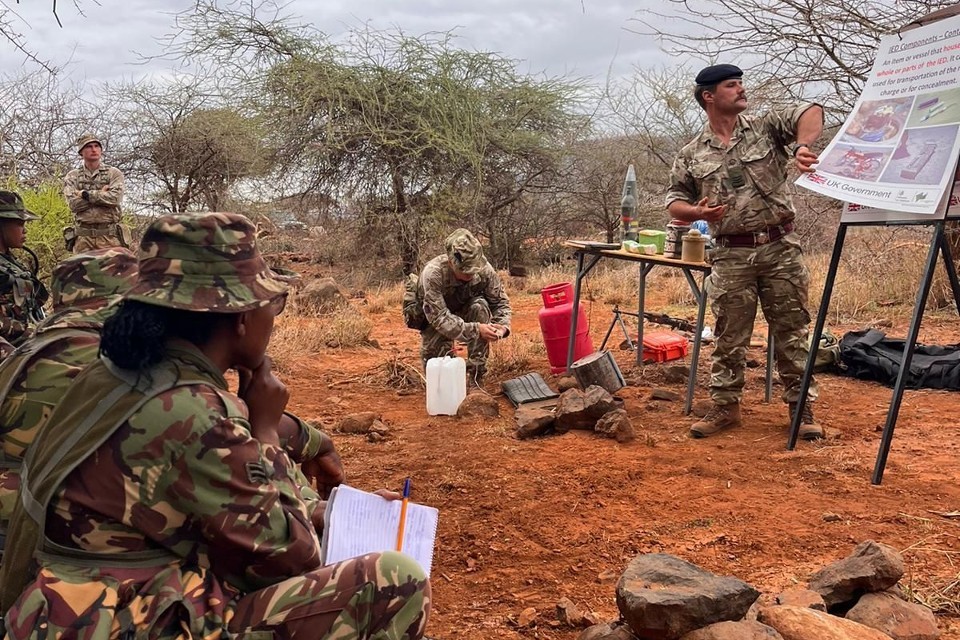
Training of Kenya Defence Forces (KDF) members in Isiolo, Kenya, in September 2022. This was a two-week training programme supported by British Peace Support Team (Africa) for over 650 KDF troops, in preparation for their deployment to the African Union Transition Mission in Somalia.
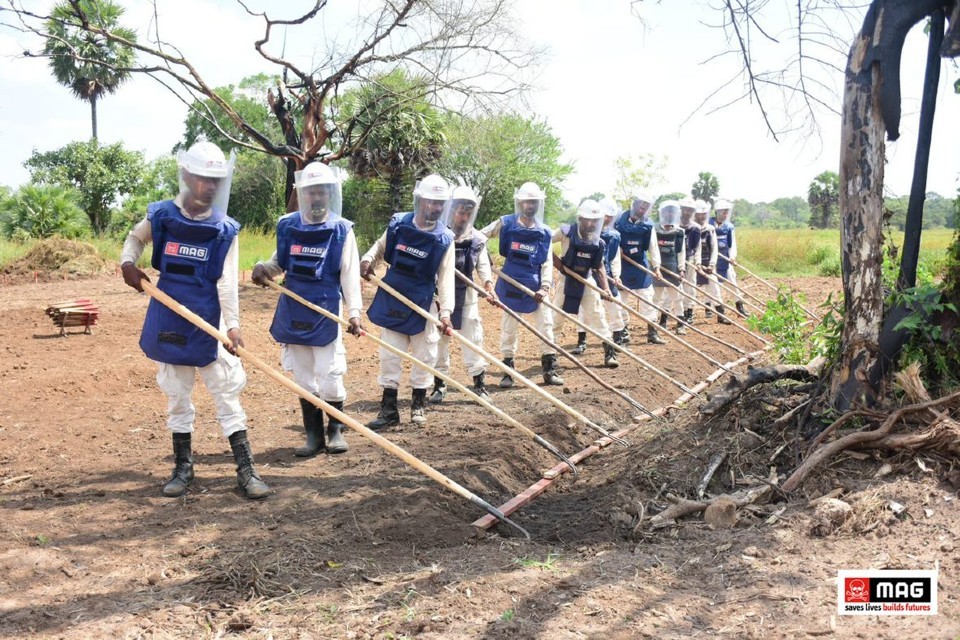
De-mining activity by CSSF Sri Lanka programme implementing partner Mines Advisory Group (MAG). The project supports the goal to have Sri Lanka declared landmine-impact free, prioritising land that enables the return of displaced populations. Credit: Mine Advisory Group.
The Bangsamoro peace process offers the promise of ending a decades-long conflict in the southern Philippines. The CSSF Philippines programme provides support to the Bangsamoro Autonomous Region of Muslim Mindanao (BARMM), ensuring the Bangsamoro Transitional Authority (BTA) is able to govern effectively and that women and girls are involved in post conflict reconstruction. As part of this the programme contributes to the Bangsamoro Normalisation Trust Fund, a mechanism that rehabilitates former rebels, provides technical assistance and mentoring to the new parliament, and improves women’s participation in the political process. This wide-ranging package of support to the region ensures the UK has significant influence with key BTA members, allowing us to help shape the new parliament and law codes, and cementing the UK’s reputation as a reliable partner for peace in the Philippines.
The Future Syria programme supports civil society organisations to collect evidence and build criminal cases to assist efforts for accountability for crimes committed in Syria. CSSF supports mechanisms to monitor and document violations of Human Rights and International Humanitarian Law, including torture, sexual and gender-based violence. The evidence collected is provided to national and international judicial mechanisms and law enforcement authorities to enforce justice. In January 2022, a German court in Koblenz became the first to convict a Syrian intelligence officer for crimes against humanity committed in Syria. The success of the trial was helped in large part by the hard work done by long-standing CSSF Syria implementing partners over many years, including the Commission for International Justice and Accountability, Lawyers and Doctors for Human Rights (LDHR) and Synergy for Justice. Excerpts from the 2019 LDHR and Synergy report on male sexual violence were included in the official court record to substantiate claims about the widespread nature of crimes committed in the Syrian detention system. The indictment was amended to include charges of sexual violence as crimes against humanity committed as part of a widespread or systematic attack against the civilian population in Syria, for which the intelligence officer was ultimately convicted. Further similar trials are in progress.
The CSSF also aims to support accountability for war crimes committed by the Islamic State in Syria, by preserving forensic evidence in mass graves in northeast Syria and enables the International Commission on Missing Persons’ efforts to develop an impartial missing persons database.
State threats
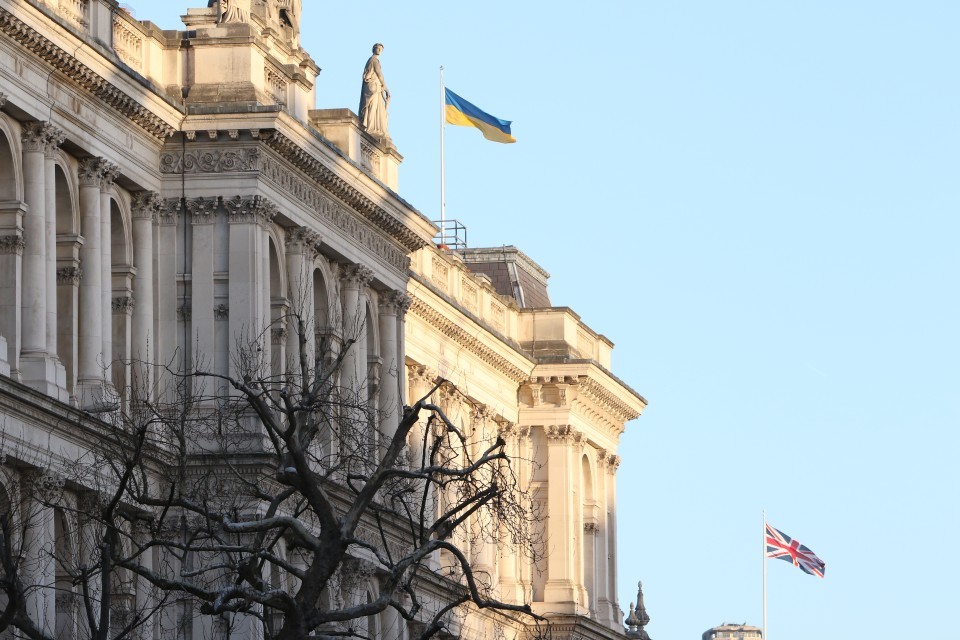
Ukraine and UK flags fly over the Foreign Office building. Credit: FCDO.

A UK aid flight carrying blankets and hygiene kits for Ukrainian refugees arrives in Moldova, 12 March 2022. Credit: Igor Zaharov/FCDO.
As set out in the Integrated Review, states continue to target the UK’s national security, presenting a threat to the UK’s interests and those of our partners. Improving the UK’s and our partners’ resilience to these evolving threats is a growing area of focus for the CSSF. The CSSF is building a new International State Threats portfolio which will continue to improve the UK’s ability to detect, disrupt, defend and deter threats, both in the physical world and in cyberspace.
For example, the CSSF-funded Counter Disinformation and Media Development (CDMD) programme has been working in Ukraine for many years to highlight and tackle Russian disinformation campaigns against Ukraine. Thanks to this existing network, at the start of Russia’s invasion of Ukraine, CDMD was able to refocus support to journalists, maintaining a free and independent media. This included the provision of emergency support to media partners in Ukraine to continue investigation and to provide timely reporting of the war. CDMD has also supported the set-up of “media hubs”. These have helped about 120 journalists and 20 media organisations to relocate to safer areas, as well as providing medical and protective equipment and health and psychological support for journalists who brave extreme risks.
The Cyber portfolio was established in April 2020. During FY 2021/22, the portfolio directly delivered against the international objectives of the UK’s National Cyber Strategy [footnote 1], in support of a free, open, peaceful and secure cyberspace. This included delivering UK commitments as Commonwealth Chair-in-Office under the 2018 Commonwealth Cyber Declaration [footnote 2], and reducing the cybercrime threat to the UK and its international partners through support to Interpol, the UN Office on Drugs and Crime, and the Commonwealth Secretariat. During FY 2021/22, the portfolio also supported research to inform its future direction and build on previous activity under the National Cyber Security Programme (2016-21), the CSSF Commonwealth Cyber Programme (2018-20), and the Prosperity Fund Digital Access Programme. Drawing on the Cyber Maturity Model developed and delivered by Oxford University, this scoping has supported development of a series of new regional cyber programmes delivering the National Cyber Strategy. In future these new regional programmes will further develop UK cyber capacity building and strengthen cooperation with like-minded partners.
For instance, the UK is one of Georgia’s leading cyber partners, and the CSSF programme has been instrumental in supporting Georgia to develop its cyber resilience. In 2021/22, CSSF supported Georgia to implement a National Cyber Security Strategy, ensuring the country can defend itself against growing cyber threats. The programme has also supported Georgia’s Office of National Security Council to develop its cyber department, which is now playing a vital role in coordinating delivery of the strategy and a cross government action plan. The programme also supports specific agencies, including Georgia’s Ministry of Defence, to assess emerging needs and identify key support the department will require over coming years in order to bolster their cyber defences and capability. Our work is closely aligned to that of the US and allies to support Georgia’s NATO ambitions and reinforces the UK’s position as a lead ally on cyber within NATO.
Transnational threats
As set out in the Integrated Review, transnational threats, such as illicit finance, Serious Organised Crime (SOC) and terrorism, affect everyone. Such threats require collective action and multilateral cooperation to be addressed.
Serious and organised crime
SOC continues to have a significant impact on UK citizens and the global economy. The increasing scale and complexity of SOC – enabled by new technologies – means Governments need adaptable and innovative solutions. Most SOC continues to be transnational: criminals will source illicit goods, exploit the vulnerable and defraud UK citizens and businesses from overseas. SOC also enables state threats, irregular migration and terrorism, and undermines regional stability, especially in post-conflict zones.
The UK and Europe have increasingly become a target for drugs exported from South America, rising in the past decade as an end destination for 12% of total exports to 45%. While the UK already had anti-narcotics teams in place in other parts of South America, Ecuadorian customs lacked the support and resourcing to combat narcotics smuggling. With CSSF funding, the Home Office began to support Ecuador through the provision of training and equipment. In collaboration with the US, the Anti-Narcotics Police of Ecuador established a dedicated Analysis and Targeting Centre. The United States’ International Narcotics and Law Enforcement Unit (INL) funded the renovation of a dedicated building in Guayaquil in order to develop it into the Analysis Centre, and asked the UK to partner with them to provide software, technology and equipment to deliver the project. As a result in the first quarter of 2022-2023 the centre was responsible for the detection and seizure of 29 tonnes of cocaine, compared to just 8 tonnes seized in the whole of the previous financial year. The centre has been directly responsible for the seizure of cocaine worth an estimated £2 billion since it became operational. This support has extended to ports, where the software supplied by the UK vastly accelerates the process of investigating ships and identifying containers that are more likely to yield seizures, which in turn makes corruption harder.
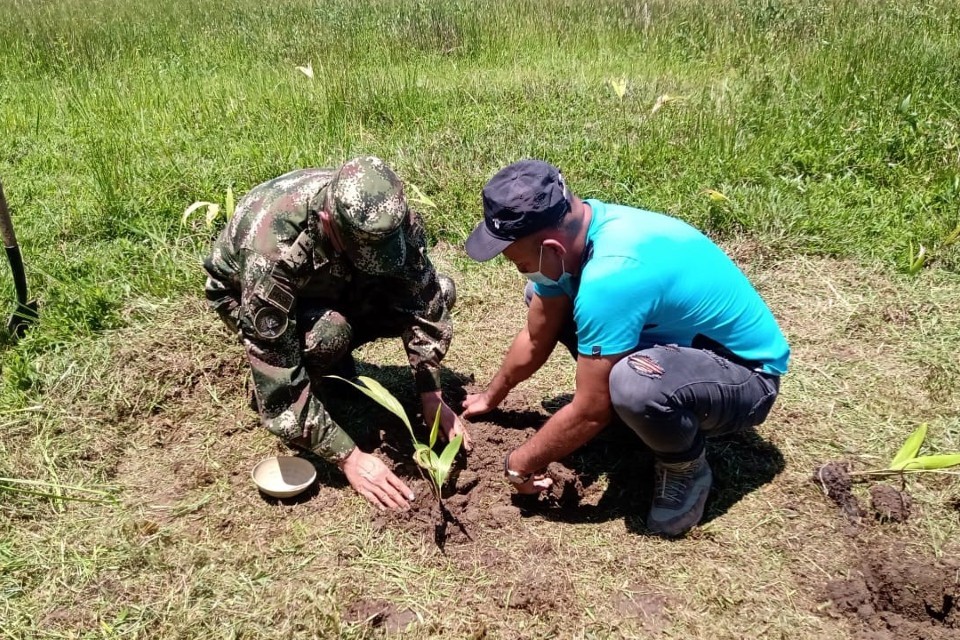
Local farmers, including ex-combatants, indigenous people and security forces, working on the blended finance "dream de açaí", project that aims to generate economic opportunities for the farmers of Putumayo. The project is run by Corpocampo, supported by the United Nations Multi-Donor Fund and the CSSF. Credit: Corpocampo.
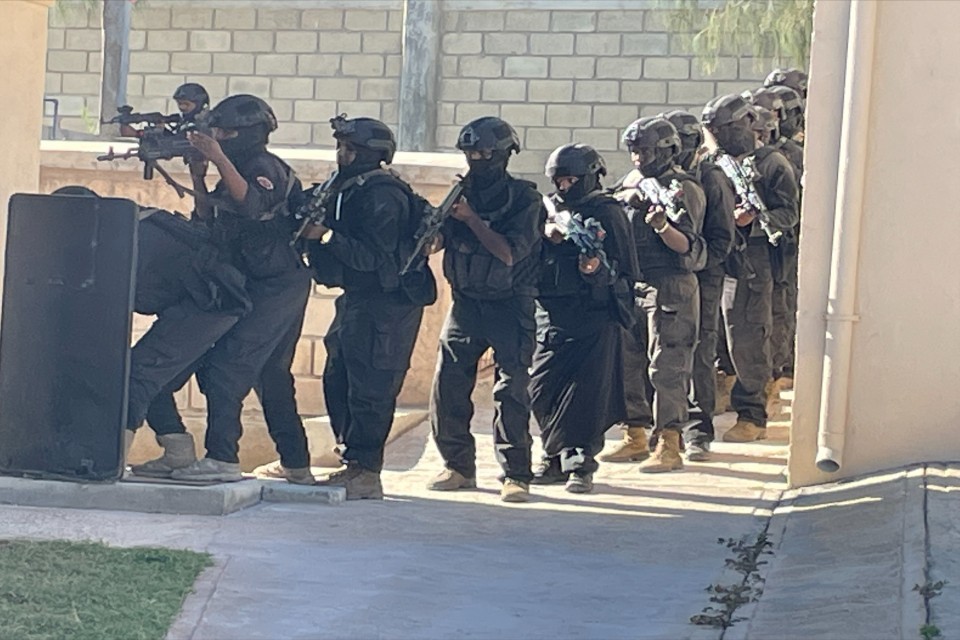
Somali security forces take part in a UK-funded training exercise. Credit: FCDO.
Transnational environmental crime generates an estimated $110 to $281 billion annually [footnote 3], much of which also funds SOC and terrorism. The CSSF has delivered an environmental crime toolkit to aid institutions to root out this illegal activity. The toolkit is designed to help identify illicit financial transactions related to the Illegal Wildlife Trade (IWT) and shine a spotlight on high level corrupt individuals in line with UK Global Sanctions. The toolkit was launched by the Duke of Cambridge at the Dubai Expo and presented to a law enforcement subgroup of the G7, receiving unanimous support. After global launches in UAE and Kenya in March 2022, the toolkit was endorsed by financial institutions in Africa and Asia. Intensive engagement with Japanese authorities on the toolkit increased Japan’s focus on the transnational environmental crime issues significantly during their G7 Presidency.
Terrorism
Terrorism remains a major threat, with a wide range of causes, new sources of radicalisation and evolving tactics. The CSSF Collective Resilience Against Extremism (CREATE) programme in East Africa provides intervention packages for individuals identified as being most at risk of radicalisation and recruitment. These packages provide mentorship and psycho-social support, and referrals to socio-economic opportunities and advice. To date, 1,329 individuals at risk have received integrated support that has increased their resilience and reduced their vulnerability to radicalisation. CREATE uses research, analysis, and training to facilitate greater understanding of the dynamics of violent extremism, and to inform future policy and programming. Eighteen civil society organisations used knowledge and skills offered by the programme to engage the Kenyan government on matters relating to the prevention of violent extremism and to identify, mentor, refer, and safeguard at-risk men and women.
CREATE’s engagement and support is helping government partners across Kenya, Tanzania and Uganda to promoting Whole-of Society and Whole-of-Government approaches to preventing violent extremism and increasing engagement with wider sectors of government and society. Government bodies across coastal and central counties of Kenya have taken concrete steps to mainstream prevention and countering of violent extremism (PCVE) into their wider activities and budgets. Legislation enabling the allocation of county-level PCVE resources has passed in two counties with CREATE support. The successes of such work have been used by the National Counter Terrorism Centre to guide the development of national-level mainstreaming initiatives.
Women Peace and Security
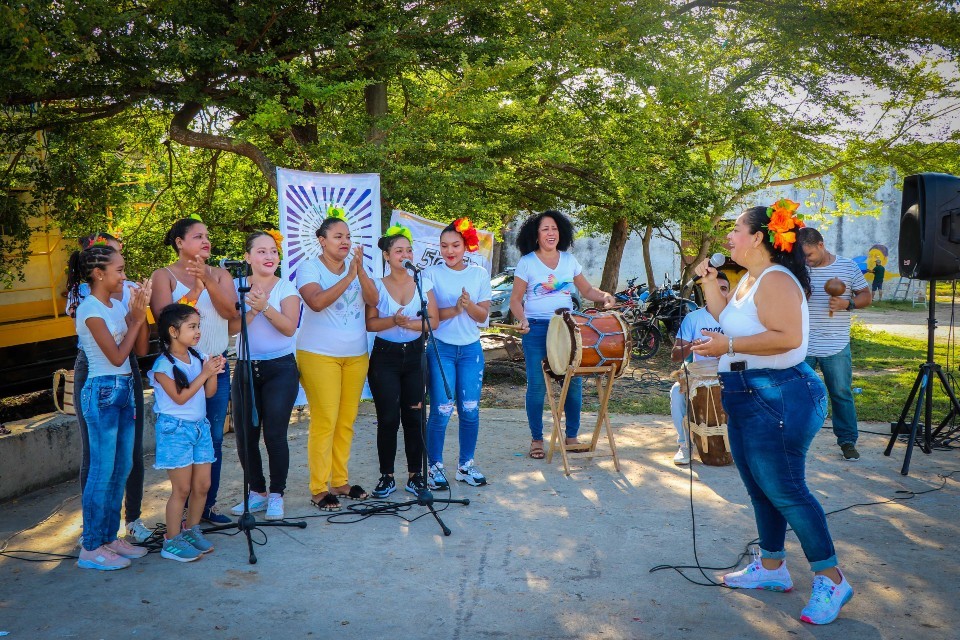
The Tour of the "Feast for Truth" stops in Gamarra, Colombia. This tour brought together young people, artists and local communities in support of reconciliation and memory and truth processes in Colombia. This was part of the CSSF “Supporting civil society participation in transitional justice” project. Credit: Fundación 5ta con 5ta Crew.
Projects funded by the CSSF contribute to advancing the UK’s National Action Plan on Women, Peace and Security (UK NAP). The CSSF supports projects aimed at improving gender equality and women’s rights, and mainstreaming gender issues in post-conflict reconstruction. This helps to create sustainable conditions for peace, security and stability.
Last year a new portfolio was developed within the CSSF: Gender, Peace and Security. It aims to research, test and innovate approaches on Women, Peace and Security issues, including in emerging security areas that will inform future UK policy. For instance the portfolio piloted projects addressing the links between gender equality, violence, and climate change. The Gender-Transformative and Equitable Natural Resources (GENRE+) project centred on women’s participation in the management of natural resources in Mali. The project supported community dialogues with local officials, training and capacity building on natural resource management, and raised awareness of gender equality issues among landowners, village councillors and religious leaders. As a result, more women in target communities in Mali were promoted to village councillors, women and girls’ access to natural resources in their localities increased from 51% to 90%, and over 75% of community members valued the involvement of women in the management of resources.
The evidence base for Women, Peace and Security makes clear that progress on women’s meaningful and equal participation cannot be made without preventing violence against women and girls (VAWG). In Libya the CSSF supported Democracy Reporting International’s (DRI) social media monitoring project on online violence targeted at politically engaged women. The findings highlighted that the nature of violence against women political activists varies from misinformation and disinformation to deep fake campaigns. The more women are visible online, the more they are exposed to harassment or hate speech, including rape and death threats. To enable early identification and prevention of online violence, DRI produced a lexicon of harmful terms and words in Libyan dialects. The findings have been important to document formally the scope of the problem, and to provide the evidence needed to highlight the importance of protecting women from violence alongside participation work, particularly in a context where this is not widely acknowledged or accepted.
Social inclusion as well as gender equality is a growing area of work through CSSF. The Voice of all for Peace project focused on the inclusion of excluded groups – those subjected to multiple, simultaneous forms of discrimination – into community security activities in northeast Nigeria. These included people from minority religious and ethnic groups, young single mothers, survivors of rape, sexual and gender minorities, and people with disabilities. Through a mix of activities including mentoring, network building, and workshops, the project achieved tangible changes in behaviours and beliefs. This included a reduction in incidents of physical abuse against young people with disabilities, decreasing use of derogatory language against religious minorities, and cases of reconciliation between survivors of sexual violence and their families. By the end of the project, 74% of people in the target communities perceived those from typically excluded groups to have greater legitimacy in peacebuilding and community security activities, up from 30% at the outset.
CSSF governance
Ministerial accountability to Parliament for the CSSF lies with the Cabinet Office. During the latter part of financial year 2021/22 this fell to the Minister for the Cabinet Office, the Rt Hon Michael Ellis KC MP, who succeeded the previous Minister, the Rt Hon Penny Mordaunt MP on 16 September 2021. The CSSF’s Senior Responsible Owner is the Deputy National Security Adviser (DNSA). For the period of this Annual Report, this was David Quarrey, who was succeeded on 19 June 2022 by Sarah MacIntosh. Oversight and management of the CSSF is provided by the Joint Funds Unit (JFU) within the National Security Secretariat of the Cabinet Office. The JFU undertakes the following key functions:
- ensuring that the Fund delivers against National Security priorities, through a strategic, cross-government approach
- ensuring that programming represents value for money and evaluating impact
- setting the operating framework that underpins CSSF programme design and delivery
- ensuring that programmes across the Fund follow government best practice and have the appropriate structures in place to manage risk and their allocated funds to a consistently high standard
The JFU also provides extensive advisory support to the CSSF network. This is facilitated by JFU advisors with expertise in programme management, MEL, gender, climate, cyber, conflict, data, governance and security. The support provided includes training, subject matter guidance and technical assistance. The JFU places strong emphasis on lesson-learning and sharing of best practice.
Monitoring, evaluation and learning (MEL) and data analytics in 2021 to 2022
MEL helps us better deliver our programmes and adapt according to lessons learned. Good MEL – data gathering, analysis and learning – gives CSSF the tools to ensure that the right programming decisions are taken, to demonstrate the value of our work, and provide evidence that CSSF programmes are delivering value for money. MEL helps our programming adapt to address the most pressing national security challenges.
CSSF’s approach to MEL focuses on demonstrating clearly, with robust evidence, what the CSSF is achieving across the global network and how the Fund contributes to UK National Security priorities. This includes having an up-to-date and systematic understanding of what works and what does not, and ensuring this is used to inform strategic decisions and programme design and delivery.
During 2021/22, the CSSF has developed and rolled out a fund-wide MEL system which enables reporting against the Fund Level Outcomes from across the global network. We have introduced consistent quarterly reporting across all geographic and thematic portfolios covering performance, impact and learning, and initiated thematic evaluations on key evidence gaps in National Security priority areas. This has aimed to support improved strategic alignment, accountability and learning. There was also continued focus on building internal capability through bespoke MEL training and successful peer-to-peer learning networks, sharing evidence and lessons to improve programme delivery.
The Fund has strengthened its Data Analytics capability this year to provide timely and high-impact insights for portfolios and programmes. Equipping the CSSF with more innovative data analysis methods has supported stronger, more evidence-based decision-making across a range of geographic and thematic areas. Throughout 2021/22 the Fund has delivered a series of pilot projects to equip decision-makers with new techniques and evidence bases. Projects, included visualisation of energy use in the Western Balkans, forecasting and predictive modelling of cross-border migration, social media sentiment analysis and a multi-year analysis of votes on cyber issues at the UN.
Gender
Teams working on CSSF programmes are making good progress in mainstreaming gender equality across all projects. To aid this, the JFU adapted the international Gender Equality Markers (GEMs) to create a more bespoke tool for the CSSF: Gender Equality and Social Inclusion (GESI) Markers. The GESI Markers build on the original function of the GEMs by assisting teams at the project design stage to integrate gender, consolidating evidence of gender mainstreaming for each project, and requiring assessment of project delivery. The GESI Markers will also help the JFU to track more data and analysis on gender equality and social inclusion, such as spending against each marker category, inclusion of marginalised groups in CSSF projects, and trends in project level outcomes.

De-mining activity by CSSF Sri Lanka programme implementing partner Mines Advisory Group (MAG). The project promotes gender equality through demining employment. 24% of those employed for mine clearance by MAG are female, many of whom are conflict-affected female heads of households in Sri Lanka. Credit: Mine Advisory Group.
Non-discretionary funding and the Rapid Response Mechanism
The CSSF manages several of the UK Government’s non-discretionary funding commitments. This includes the UK’s mandatory assessed contributions for peacekeeping (to the UN, OSCE, and NATO) and Criminal Tribunals (the ICC, and the IRMCT). This also includes the net additional costs for UK troop deployments to UN Peacekeeping Missions, and the UK’s bilateral contribution to support the African Union Mission in Somalia (AMISOM) and the UN Support Office in Somalia (UNSOS).
As part of this peacekeeping funding the CSSF completed the roll-out of the Comprehensive Planning and Performance Assessment System (CPAS) to twelve UN peacekeeping missions. CPAS is a tool that offers data and analysis to inform peacekeeping operations and reporting. In doing so, CPAS has enabled a data-driven approach to tracking the progress of thematic priorities, such as gender mainstreaming, protection of civilians and human rights, within peacekeeping operations. For instance CPAS provided data on human rights violations in the Central African Republic that the UN was able to use to identify perpetrators and provide evidence for discussions with the Government on measures to prevent this.
The CSSF also oversees the Rapid Response Mechanism (RRM), allowing for the mobilisation of emergency non-ODA resources where countries are ineligible for ODA. In 2021-22, the RRM had a provision of £20m of non-ODA from within the CSSF’s budget and had access to a further £20m from HMT’s Special Reserve. The RRM has been deployed in all major crises since the CSSF was set up. In 2021/22 it was deployed to support parts of the immediate HMG response to the Russian invasion of Ukraine. The RRM was also used to fund the initial phase of Covid 19 repatriations.
Budget allocations
While much of the CSSF’s funding is on multi-year programmes, spending is reviewed annually through a budget allocation exercise. HM Treasury commissions a comprehensive review of the CSSF each year to ensure that funds are allocated to the highest strategic priorities and deliver value for money for the taxpayer, a key consideration for all CSSF activities. 2021 was the first year that the UK government’s commitment to spend 0.7 per cent of Gross National Income was temporarily reduced to 0.5 per cent, as announced in November 2020. This has required significant reprioritisation across the UK government. In addition to this ODA spending has been impacted by the severe economic downturn and the Russian invasion of Ukraine. As a result the Government is revisiting and revising indicative ODA allocations made in previous years to ensure they fit within the 0.5 target.
Working in high-risk environments
Given the operating environments in which the CSSF works, a key principle of the Fund is its ability to maintain a high-risk appetite. This is done with careful consideration and in line with HMG’s approach more generally to risk management. CSSF teams are required to identify, monitor and mitigate as far as possible the risks associated with their programmes to ensure they do no harm and represent value for money. They must also consider how risks might differ for groups defined by any of the protected characteristics as well as our staff implementing the programmes. Portfolio Boards are required to review programme and portfolio risks on an ongoing basis, noting any residual risk remaining after mitigating actions have been taken.
Decisions about how much risk is tolerable within different parts of the CSSF portfolio are delegated to Portfolio Boards and are based on the context, strategic priority, value and potential positive impact of programmes. Where residual risk in a programme or portfolio remains very high, risk management decisions are escalated to Ministers.
For all security and justice programmes, Overseas Security and Justice Assessments (OSJAs) represent an additional risk management process to assess human rights risks, identify any mitigating actions and outline any residual risk. Portfolio Boards and programme teams in country are responsible for ensuring that OSJAs are in place for relevant programmes before activities start. They should be reviewed at least annually, for extensions or changes to programme design and delivery, and when there has been a substantial change in the circumstances where a programme is operating. OSJAs and their reviews can result in activity being redesigned, paused or stopped, for example, where environments have changed to such an extent that the identified risk threshold has been exceeded.
Annex A: CSSF financial spend 2021 to 2022
1. Overall spend
The final CSSF 2021/22 cross government allocation was £864.2 million. Total CSSF spend was £858.7 million (99.4%). This is subject to final departmental audits.
Figure 1
- Final CSSF Allocation FY 2021 to 2022: £864.2 million
- CSSF Spend FY 2021 to 2022: £858.7 million
The total CSSF 2021 to 2022 spend of £858.7 million can be split by:
Figure 2: CSSF spend by government department for financial year 2021 to 2022
| Department | Total spend (£ million) | % |
|---|---|---|
| FCDO | £715.20 | 83.29% |
| MOD | £86.09 | 10.03% |
| HO | £38.36 | 4.47% |
| CO | £7.01 | 0.82% |
| DFT | £3.40 | 0.40% |
| DHSC | £1.89 | 0.22% |
| NCA | £1.86 | 0.22% |
| DEFRA | £1.79 | 0.21% |
| HMRC | £1.10 | 0.13% |
| UKHO | £1.01 | 0.12% |
| MOJ | £0.75 | 0.09% |
| CPS | £0.21 | 0.02% |
| Total | £858.66 | 100% |
Figure 3: CSSF discretionary spend by HMG department for financial year 2021 t0 2022
| Department | Total spend (£ million) | % |
|---|---|---|
| FCDO | £375.17 | 77.20% |
| MOD | £53.42 | 10.99% |
| HO | £38.36 | 7.89% |
| CO | £7.01 | 1.44% |
| DFT | £3.40 | 0.70% |
| DHSC | £1.89 | 0.39% |
| NCA | £1.86 | 0.38% |
| DEFRA | £1.79 | 0.37% |
| HMRC | £1.10 | 0.23% |
| UKHO | £1.01 | 0.21% |
| MOJ | £0.75 | 0.16% |
| CPS | £0.21 | 0.04% |
| Total | £485.97 | 100% |
2. Regional and thematic spend
Corporate Delivery Support includes the Joint Funds Unit (JFU) and Global Monitoring Evaluation and Learning (GMEL), allocated as follows:
- JFU: £12.41 million
- GMEL: £5.00 million
Figure 4: 2021 to 2022 CSSF spend by regional, cross regional and non-discretionary theme
| Theme | £ million |
|---|---|
| Peacekeeping | £312.43 |
| MOD Ringfences | £32.66 |
| Middle East and North Africa | £100.31 |
| South Asia | -£1.75* |
| Sub-Saharan Africa | £93.63 |
| Eastern Europe and Central Asia | £110.42 |
| Overseas Territories | £42.67 |
| Western Balkans | £40.62 |
| Multilateral Strategy | £8.88 |
| Counter Terrorism Programme fund | £32.47 |
| Corporate Delivery Support | £17.41 |
| Serious and Organised Crime | £20.54 |
| Americas | £8.97 |
| Asia Pacific | £9.31 |
| Migration | £5.45 |
| Cyber | £18.07 |
| Gender, Peace and Security | £3.63 |
| National Security Communications | £2.87 |
| Total | £858.58 |
*The CSSF received a lot of credits in relation to unspent funds connected to the ANATF (Afghanistan National Army Trust Fund), resulting in overall spend for the region being a negative.
Figure 5: Proportion of 2021 to 2022 CSSF spend by regional, cross regional and non-discretionary theme
| Theme | % |
|---|---|
| Peacekeeping | 36.39% |
| MOD Ringfences | 3.80% |
| Middle East and North Africa | 11.68% |
| South Asia | -0.20% |
| Sub-Saharan Africa | 10.90% |
| Eastern Europe and Central Asia | 12.86% |
| Overseas Territories | 4.97% |
| Western Balkans | 4.73% |
| Multilateral Strategy | 1.03% |
| Counter Terrorism Programme fund | 3.78% |
| Corporate Delivery Support | 2.03% |
| Serious and Organised Crime | 2.39% |
| Americas | 1.04% |
| Asia Pacific | 1.08% |
| Migration | 0.64% |
| Cyber | 2.10% |
| Gender Peace and Security | 0.43% |
| National Security Communications | 0.33% |
3. ODA/non-ODA
Figure 6
The 2021 to 2022 total spend was split by £347.1m (40.4%) of ODA and £511.52m (59.6%) of non-ODA.
A breakdown of calendar year 2021 CSSF ODA spend by Department can be found in the Statistics on International Development report published on GOV.UK [footnote 4]
Figure 7: Total CSSF 2021 to 2022 ODA spend - £340.1m by region, cross-regional, and non-discretionary theme
| Theme | £ million |
|---|---|
| Middle East and North Africa | 73.62 |
| Peacekeeping | 58.82 |
| South Asia | 9.94 |
| Eastern Europe and Central Asia | 43.36 |
| Sub-Saharan Africa | 36.40 |
| Western Balkans | 34.55 |
| Multilateral Strategy | 4.60 |
| Counter Terrorism Programme fund | 18.37 |
| Corporate Delivery Support | 11.41 |
| Americas | 8.96 |
| Asia Pacific | 8.90 |
| Serious and Organised Crime | 13.30 |
| Overseas Territories | 3.96 |
| Migration | 5.45 |
| Cyber | 11.93 |
| Gender Peace and Security | 3.48 |
Official Development Assistance
- ODA: 40.4%
- Non-ODA: 59.6%
CSSF achieved 70% spend against the 71% ODA spending target by 31 December 2021. This contributed to the UK’s commitment to spend 0.5% of GNI on aid.
The top 5 recipients of ODA were:
- Ukraine £23.5 million
- Lebanon £13.6 million
- Syria £10.2 million
- Somalia £9.9 million
- Occupied Palestinian Territories £8.9 million
Non-ODA
The top 5 geographical recipients of non-ODA were:
- Somalia £43.4 million
- Overseas Territories £42.7 million
- Ukraine £34.2 million
- Lebanon £11.1 million
- Jordan £10.8 million
When combined with MOD ringfences of £32.7m and Peacekeeping non-ODA £253.6m, this accounts for approximately 84% of total non-ODA spend.
Figure 8: Total CSSF 2021 to 2022 Non-ODA spend, by region, cross-regional and non-discretionary theme
| Theme | £ million |
|---|---|
| Peacekeeping | 253.61 |
| MOD Ringfences | 32.66 |
| Overseas Territories | 38.72 |
| Sub-Saharan Africa | 57.23 |
| Eastern Europe and Central Asia | 67.05 |
| Middle East and North Africa | 26.69 |
| Serious and Organised Crime | 7.24 |
| Counter Terrorism Portfolio | 14.10 |
| South Asia | -11.68 |
| Western Balkans | 6.07 |
| Multilateral Strategy | 4.28 |
| National Security Communications | 2.87 |
| Cyber | 6.14 |
| Asia Pacific | 0.41 |
| Corporate Delivery Support | 5.99 |
| Gender, Peace and Security | 0.15 |
| Americas | 0.04 |
Annex B: CSSF non-discretionary spend 2021 to 2022
| UN peacekeeping and other multinational contributions | Spend £ million | ODA (£ million) | Non-ODA (£ million) |
|---|---|---|---|
| United Nations Organisation Stabilisation Mission in the Democratic Republic of Congo (MONUSCO) | 45.0 | 7.1 | 37.9 |
| United Nations Mission in South Sudan (UNMISS) | 48.2 | 7.5 | 40.7 |
| United Nations Multidimensional Integrated Stabilisation Mission in Mali (MINUSMA) | 49.8 | 7.8 | 42.0 |
| United Nations Multidimensional Integrated Stabilisation Mission in the Central African Republic (MINUSCA) | 42.2 | 6.5 | 35.7 |
| United Nations African Union Mission in Darfur (UNAMID) | 6.5 | 1.2 | 5.3 |
| United Nations Support Office in Somalia (UNSOS) | 20.3 | 0.0 | 20.3 |
| United Nations Interim Force in Lebanon (UNIFIL) | 20.2 | 3.1 | 17.1 |
| United Nations Interim Security Force for Abyei (UNISFA) | 11.1 | 1.7 | 9.4 |
| United Nations Disengagement Observer Force (UNDOF) | 2.2 | 0.0 | 2.2 |
| United Nations Mission for the Referendum in Western Sahara (MINURSO) | 2.4 | 0.4 | 2.0 |
| United Nations Interim Administration Mission in Kosovo (UNMIK) | 1.6 | 0.3 | 1.3 |
| United Nations Peacekeeping Force in Cyprus (UNFICYP) | 1.2 | 0.0 | 1.2 |
| UN Peacekeeping Credits | -3.5 | 0.0 | -3.5 |
| Sub Total | 247.2 | 35.6 | 211.6 |
| UN Special Political Missions | 23.5 | 11.7 | 11.8 |
| UN Tribunals | 2.6 | 0.0 | 2.6 |
| International Criminal Court | 10.5 | 0.0 | 10.5 |
| Organisation for Security and Co-operation in Europe Field Missions | 15.4 | 11.9 | 3.5 |
| NATO Kosovo Force (KFOR) | 1.7 | 0.0 | 1.7 |
| Total | 300.9 | 59.2 | 241.7 |
| Foreign Exchange Adjustment (gains and losses on advance purchases of foreign currency) | 11.4 | 0.0 | 11.4 |
| Total Peacekeeping Budget | 312.3 | 59.2 | 253.1 |
Any enquiries regarding this publication should be sent to us at NSSJointProgrammeHub@fcdo.gov.uk
-
https://www.gov.uk/government/publications/national-cyber-strategy-2022/national-cyber-security-strategy-2022#pillar-4-global-leadership ↩
-
https://thecommonwealth.org/commonwealth-cyber-declaration-2018 ↩
-
https://www.adelphi.de/en/publication/nature-conflict-and-peace-links-between-environment-security-and-peace-and-their ↩
-
https://www.gov.uk/guidance/statistics-on-international-development ↩
